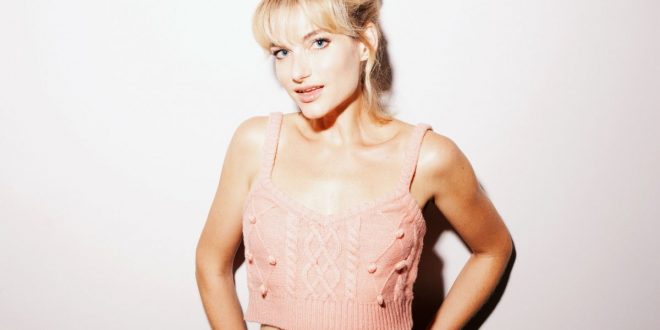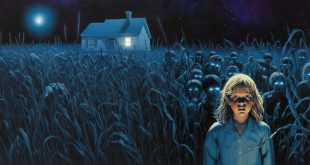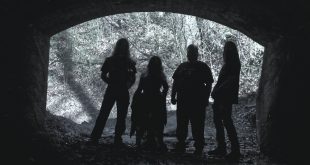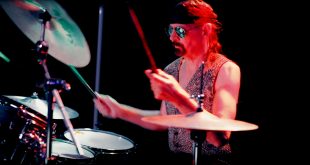Jo Eubanks is an emerging singer/songwriter with an established classical background that began prior to her reaching adolescence. Since 2018, Eubanks gained the moniker Coyote Eyes, which combines the sonic charge of electronic pop with the lyrical concept of duality. As she puts it, “The coyote represents the wild paradox existing within myself, within us all.” She adds, “Each and every one of us navigates the world as both predator and prey.”
Today, Eubanks unveils her newest single, “Haunt You in Your Sleep.” The song was inspired by her coming to terms with a difficult breakup and follows her extreme idea for exacting revenge.
To gain more insight, I caught up with Eubanks, who was open to discuss the inception of Coyote Eyes, the story behind her new single, as well as how far she has come in understanding the depths of her musical identity.
You trained as a classical singer at 11 years old. Looking back, how did that experience influence the way you approach your own music?
That’s such a great question! When I grew up and started singing opera, I really thought I was going to take that path, and when it came to writing lyrics, it was just poetry. I considered myself a singer and poet, and never thought of merging [classical and contemporary music]. But the change for me happened once I saw Baz Luhrmann’s film adaption of Romeo and Juliet. The way some of the composers merged electronic with classical music, it was just this pivotal moment for me, and made me realize that I could do both. So now, as a writer, that’s how I approach things. Usually, I’ll get on the piano and start with a classical melody, then build on top of it with lyrics. But it always starts with a classical idea.
At the time, you also got into a lot of 90s alternative rock. Did that go hand-in-hand with your interest in classical music, or did that interest develop separately?
I think I was into both, but I kept that interest separate for a long time. Going back to the classical thing, I grew up in a university town, and I loved a lot of what was in the music department there. When I was a kid, my parents thought it was odd that I was singing opera as an eight-year-old, but also recognized that I had talent and wanted me to do something with it. So, I was training, and training, and training, and to be honest with you, I always thought I would go in the direction of musical theater; my dream was to be in Phantom of the Opera.
With the 90s stuff, there was something about the way Garbage, The Cranberries, and all those singers and bands handled these subjects that were so taboo but were also universal. At the start of high school, that’s when I would take these 90s songs, learn them on piano, then rearrange them in kind of a classical way. It’s always been a blend of that with some other type of music.
By the time you were 16, you were already attracting label interest. What was going through your mind as that was happening?
At first, it was one of those things where I was like, “Is this really happening to me?” But I also felt like it was the right move, and that it was always what I wanted to do. I was a really shy kid and kind of kept to myself with my music, but once that happened, it felt like everything was in order, and was what was right in my life.
Later on, you tried your hand at songwriting in Los Angeles, where you are now, and you also moved to New York for a while. How did that transition into working with Mario McNully?
At that time, I was actually working in theater. It was after a series of lucky events in LA. There was a theater company that I’d worked with before, they’d lost an actor and asked if I wanted to fill in, and I was like, “Sure, we’d love to get out of LA for the summer!” So, we went back east, and then I did an audition for something on a whim, booked it, and did the next show for about five years. I found Mario somewhere, but I can’t remember how. It was one of those random instances where someone I knew from North Carolina knew him. But we had coffee and then started working together.
Based on how frequently these opportunities arose, did it almost seem like a blur to you?
Yeah, I think so! (laughs)! I’d taken so many hard-right turns in life. Something would come up, and I’d go in one direction, then another thing would come up, and I’d go in another direction. Even during the pandemic, I came to LA for one meeting, and that meeting turned into me trying to create a whole album in just a few weeks. But I’ve always tried to follow wherever life takes me and run with it as much as I can.
By 2018, you began performing under the name Coyote Eyes. Was it a case of coming up with the name first, and concept second?
I think they fell into place simultaneously. Coyote Eyes was a name that just kept coming to me and I couldn’t figure out why, or what it meant. At that time, I had retired from the music industry, but Mario wouldn’t let me go on a hiatus, so he introduced me to this producer, Julie Kathryn (I Am Snow Angel). When she and I worked together, I knew I wanted to change things quite a bit, and have full control over the music, but wasn’t sure how it would turn out. I’ve done a lot of pop music before, and felt like I was just trying to fit into the ideas of what everyone thought would make me successful, but I knew that being a ‘pop’ singer wasn’t going to work for me.
When it came to the project, I thought of attaching the name Coyote Eyes to it as a temporary thing, and it actually ended up taking off. I was always interested in the concept of duality – prey and predator, hunter and hunted, and good and evil. So, I sat down with Patrick Erlich, who was managing I Am Snow Angel at the time, and he felt that it was very fitting that I chose that name. I’ve done a lot of research on coyotes, and there are traits about them that are very specific to me; it’s almost kind of creepy.
Your latest single is “Haunt You in Your Sleep,” which you worked on with Rusland Odnorolov, and I notice that it has a very nocturnal aesthetic to it. When did you two meet, and what do you enjoy about his production style?
Rusland and I met a year and a half ago. I knew of him, told him about my ideas, and he agreed to work with me. I can’t say enough good things about him; he’s just brilliant. I was literally coming at him with little hooks and piano parts, and it was like he could read my mind. It’s like telling someone about a dream you had, and then they paint it. As far as his production style, I find it to be so essential, because as much as it seems dark and haunting, it’s not overpowering. There’s definitely darkness in the concept of the song – getting revenge on someone who has wronged you. It takes you on a sonic journey, first as if you’re being seduced, and then feeling like you’re being haunted by someone. Everything Rusland does is so intricate and well-molded. I can usually be a psycho about my vocals, but with Rusland, I think we did no more than five takes. He’s just a genius.
Speaking of relationships, the song came together as a result of a devastating breakup. When it comes to writing songs, how do you control how things from your personal life affect the writing process?
For me, when something happens in my personal life, it’s very difficult for me to write about it as I’m going through it. But when I think of the past, I feel like I have to cut a path through the storm in order to put the pieces back together again. “Haunting in Your Sleep” was about something that happened about a year ago, and when I was in LA working on my album, that was actually all about stuff that was happening in real-time, which was very unusual for me. I felt that part of an artist’s job is to express things that people can feel but they can’t name, and get them out in a tangible way so that it can provide catharsis for someone going through the same thing.
From what I gather, it seems to be about getting revenge, but by giving them love instead of hurting them. What specific elements did you focus on while writing this song?
Well, when I wrote the song, it was around the time the show You was on Netflix. The main character is such a fascinating character. He stalks these women that he loves and ends up murdering four of them. Making note of that, I thought of what we define as love, and wanted to express what it would be like to love someone in such an extreme, desperate capacity. But I also wanted to add my personal experience of having gone through infidelity. We all have those fantasies of what we’d do as an act of revenge, as if to make that person remember how much they wronged us. I tried to marry those concepts as much as I could throughout the song, and center them around a character that’s similar to me, but not entirely me. By the end of it, I feel like that character is victorious, and as far as moving forward emotionally, I think she does that by gaining control of the situation.
Bringing those angles all together, do you feel like you have a deeper understanding of Coyote Eyes as a concept?
Yeah, for sure. In this song, the character is acting as both predator and prey. I think the biggest challenge was thinking about the prey perspective – someone who’s being genuinely preyed upon, rather than merely playing the victim card. But now, I feel that I’m really able to capture both views.
Putting your career in perspective, what have you learned about yourself, both as a musician, and as a person?
I think the pandemic actually revealed a lot about how I feel about myself. It wasn’t what I expected, but at the same time, it ended up being the best-case scenario. When the pandemic hit, I was already at home with my family as part of my week-long vacation, and it was the most appropriately-timed vacation of my life (laughs). I was back in North Carolina with my parents, where I grew up, with nothing but a hoodie, a pair of leggings, and a grand piano, which is what I learned to play and music on.
So, I learned that when you’re stripped of everything, your possibilities expand – the possibility of recognition, or to produce music you otherwise wouldn’t have thought of. Initially, my fear was that if my music didn’t have the same aspect of success, reward, or validation associated with it being a career, then I wouldn’t actively pursue it anymore. But what I found out was that even with the career aspect taken out of it, I actually loved it more. It surprised me how much I didn’t care about any kind of external validation; I just really love to sing and write. That helped me get back in touch with my purpose, and also ask myself, “What can I provide to other people with my music?” That was huge.
Lastly, anything you’d like to say to your fans?
I can tell you about this one interaction I had with a fan. While I was out getting coffee, there was someone who stopped me and said, “I’ve been listening to your music in quarantine, and it has really helped me remember that there is someone who’s giving me a voice.” When I heard that, I thought, “Oh, that’s what it is; that’s why I’m doing this!” If I had anything to say to my fans, it’s that whether we feel happy, sad, or angry, the greatest gift we can give to each other is just to create for the sake of creating.
Coyote Eyes Socials:
 Music Existence Because of Music, We Exist
Music Existence Because of Music, We Exist




